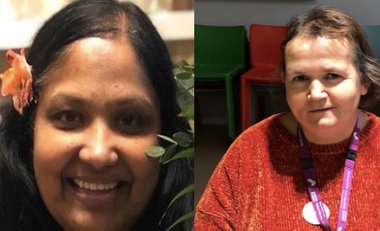17 June 2020
Learn how virtual meetings and Mindapples’ wellbeing principles keep people with learning disabilities connected during lockdown.
This Learning Disability Awareness Week (15-21 June), Ruwani Ampegama, Mind & Body Champion and Head of Education and Training Learning Disability and Autism at South London and Maudsley NHS Foundation Trust, and Maggie Brennan, training facilitator [pictured right, from left to right] share how they kept people with learning disabilities in touch with their service during the lockdown.
What’s it been like working during the pandemic?
Ruwani: Social isolation is well acknowledged to be a cause of mental ill health and people with learning disabilities often find it even harder to overcome isolation.
For me, whose job’s main purpose is to deliver face-to-face training, it was almost surreal when I first learnt that we would have to work from home for the foreseeable future.
For Maggie, my colleague who is also a training facilitator with lived experience of a learning disability and mental ill health, the concept of working from home was almost unthinkable. Social isolation would be traumatic and emotional for her and some patients.
In the ‘new normal’ of having to work from home and having no face-to-face contact with people, we found a way of staying connected.
In this unprecedented time it was vital we found a novel way to stay in contact and support our patients. We’ve been using virtual meetings, focused on taking better care of our minds and learning about mental wellbeing, in place of face-to-face contact to provide support for people with learning disabilities during the lockdown.
What sessions did you start hosting virtually?
One of the highlights of our working week before lockdown was facilitating a group for people with learning disabilities using the adapted Mindapples wellbeing principles, where we learn, do and celebrate life together.
The realisation that lockdown meant that we could no longer meet weekly was quite devastating for Maggie, many others and me. Fortunately, the lockdown brought many of us together through technology. In these remote-working forums ideas were shared, discussed and implemented.
Prof Andre Strydom, professor in intellectual disabilities at King’s College London, initially raised the possibility of continuing the weekly Mindapples group virtually. This also led us to think of creative ways of involving masters students from King’s College London and trainee psychologists working with the Estia Centre in co-producing our online sessions.
What is Mindapples?
Ruwani: Mindapples is a tool used to look after your mental health wellbeing. You learn simple techniques for managing your own wellbeing and how to share them with others. For example, starting positive conversations about mental health and talking openly about how you feel about your mind, in an accessible and non-stigmatising way, as well as signposting people to more information and support.
How have you found hosting the Mindapples groups online?
Ruwani: Within weeks of the idea being shared we were able to set up Mindapples group meetings online. We have now successfully met three times, with people joining independently from their homes or supported by family or paid carers.
Maggie: It’s really nice to meet and work with people from King’s College London and also be able to keep talking to my colleagues. I didn’t know how to use Zoom and now I am quite good at using it by myself.
For the student volunteers this was an experience that enabled them to connect theory with practice as they interacted with people with learning disabilities in an informal setting.
Ruwani: Setting up our virtual Mindapples group is a great example of how working in collaboration we can achieve many great things.
The highlight for me is the fact that this group provides positive interaction for people who may be isolated or are missing their normal day-to-day activities during the pandemic.
Ruwani: For Maggie and me, it was an opportunity to continue to support patients and vital working in the current circumstances, while also learning and improve our technical skills in using virtual meeting spaces, such as Zoom.
Maggie: I was really sad that my birthday was during lockdown, but at the Mindapples session we celebrated it together by singing happy birthday and playing virtual party games - great fun!
Chidinma Okoro, MSc student, engaged in the session said:
I really look forward to Monday afternoon sessions as a nice break from the mundane. It’s a great way to build interactive skills with people with learning disabilities and would recommend volunteering to other colleagues.
Leyan Al-Hamdani, another masters student, says:
In a previous job as a support worker I found that most of my working day was task orientated and allowed little time to get to know people as individuals. In the Mindapples meetings we are able to do fun activities that give us a chance to really get to know and understand people.
MSc student Hannah Morris says:
I really enjoy these sessions and hosting sessions have given me additional skills in finding appropriate materials to share as well as reasonable adjustments we have to make.
Our Mindapples group is expanding and evolving and we are now trying to support people to join the sessions if they have no access to smart devices or the internet.
If you are interested in finding out how to join these online sessions, please visit the Estia Centre website.
Find out more information on the King’s Health Partners Learning Disability Strategy.
King’s Health Partners Mind & Body is committed to joining up mental and physical healthcare, training and research to improve health outcomes for our patients and service users.





